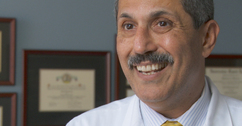 This column originally appeared at Times-Herald.com on Wednesday, November 20th, 2013 by Dr. Saeid Khansarina. Board certified in thoracic surgery, Piedmont Newnan Hospital’s Dr. Saeid Khansarinia has special interests in robotic surgery and thoracic oncology. A graduate of the University of California in San Diego, he received his medical degree from St. Louis University and completed his internship and residency in general, thoracic and cardiovascular surgery at the University of Florida. He is a Fellow of the American College of Surgeons. When you hear someone has lung cancer, what is the first thing you do? If you’re like the majority of people in the general population, you’ll ask the person who has been diagnosed with this deadly disease whether or not they have smoked. Contrary to the popular belief, lung cancer is not exclusive to smokers. While smoking certainly increases a person’s risk of developing lung cancer, it is not the only factor to consider. Lung cancer can affect just about anyone. In fact, studies show that the rate of lung cancer in younger, non-smoking women is actually on the rise.
The trouble is: medical experts aren’t sure why more non-smoking women are being diagnosed when the number of new lung cancer cases seems to have plateaued in men. Secondhand smoke and radon exposure can play a role in the development of lung cancer, but plenty of patients who have rarely been exposed can still have lung cancer, too. Early detection, the key to beating lung cancer, remains a challenge for healthcare providers because patients rarely present symptoms until it is too late. The common stereotype that lung cancer is a “smoker’s disease” continues to plague the ability to raise widespread awareness and fundraising efforts for the disease that is second only to heart disease as the largest killer in the United States. Those with known risk factors for lung cancer, including family history and people who have smoked for a long time, are encouraged to get screened and take advantage of Piedmont Newnan Hospital’s discounted, low-dose computed tomography (CT) lung cancer screenings. (For more information, visit piedmont.org/lung.) Lung cancer is responsible for claiming the lives of more people than colon, breast and prostate cancer combined. Yet, so few know about it or think it cannot affect them because they don’t smoke. This year, 159,480 Americans with lung cancer will die. Approximately 16,000 to 24,000 of these people who died never even smoked, according to the American Cancer Society. Symptoms can be as vague as coughing, shortness of breath, wheezing, recurring lung infections and hoarseness. While screening mechanisms are still being developed for younger, non-smoking men and women, it is always important to pay attention to what your body is telling you about your health. If you notice symptoms such as those listed above, it is best to seek help from a medical expert.
0 Comments
Your comment will be posted after it is approved.
Leave a Reply. |
Details
|


 RSS Feed
RSS Feed
